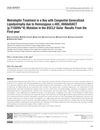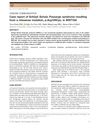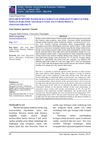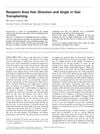 6 citations,
November 2019 in “The application of clinical genetics”
6 citations,
November 2019 in “The application of clinical genetics” The study found that a specific genetic variation in the TNFα gene is significantly linked to Alopecia Areata in the Jordanian Arab population.
 4 citations,
December 2020 in “Neuropsychiatric Disease and Treatment”
4 citations,
December 2020 in “Neuropsychiatric Disease and Treatment” Women with skin conditions who have body image concerns often experience mental health issues and a lower quality of life.
 3 citations,
November 2020 in “Clinical, Cosmetic and Investigational Dermatology”
3 citations,
November 2020 in “Clinical, Cosmetic and Investigational Dermatology” Early diagnosis and combination therapy, especially with finasteride and dutasteride, are key to managing Frontal Fibrosing Alopecia effectively.
 3 citations,
June 2020 in “Open access rheumatology”
3 citations,
June 2020 in “Open access rheumatology” A patient with Rhupus was diagnosed with Rowell syndrome and treated with various medications.
 2 citations,
August 2020 in “Clinical, Cosmetic and Investigational Dermatology”
2 citations,
August 2020 in “Clinical, Cosmetic and Investigational Dermatology” The hair-growth formula with L-cystine helps protect and grow hair cells.
 2 citations,
February 2020 in “Diabetes, Metabolic Syndrome and Obesity: Targets and Therapy”
2 citations,
February 2020 in “Diabetes, Metabolic Syndrome and Obesity: Targets and Therapy” A woman experienced vertigo and hearing loss after weight loss surgery, possibly due to eustachian tube issues from fat loss around ear muscles.
 1 citations,
December 2023 in “Curēus”
1 citations,
December 2023 in “Curēus” Most children with a common hemochromatosis genotype had elevated iron levels but no severe symptoms.
![Minoxidil and Its Use in Hair Disorders: A Review [Corrigendum]](/images/research/d5b5fb1b-96a4-4e61-a554-3fe9a1f78497/small/11472.jpg) 1 citations,
February 2020 in “Drug Design Development and Therapy”
1 citations,
February 2020 in “Drug Design Development and Therapy” Low-dose Minoxidil combined with Spironolactone helps reduce hair loss and improve hair density in women, with some mild side effects.
1 citations,
December 2019 in “Clinical ophthalmology” Bimatoprost eye drops make rabbit eyelashes longer, thicker, and darker, and increase the number of lashes without causing inflammation.
 January 2024 in “Archives of Endocrinology and Metabolism”
January 2024 in “Archives of Endocrinology and Metabolism” A new gene mutation causes insulin resistance in a girl and her mother.
8 citations,
March 2011 in “Endocrine” A new gene mutation causes vitamin D-resistant rickets and hair loss in two siblings.
5 citations,
April 2022 in “Egyptian Journal of Chemistry” Sansevieria trifasciata shows promise as a natural treatment for hair loss.
 1 citations,
June 2022 in “JCRPE”
1 citations,
June 2022 in “JCRPE” Metreleptin treatment significantly improved metabolic health in a boy with congenital generalized lipodystrophy.
 5 citations,
December 2017 in “The Journal of Dermatology”
5 citations,
December 2017 in “The Journal of Dermatology” A new gene mutation caused a man's rare skin condition, Schöpf-Schulz-Passarge syndrome.
 1 citations,
September 2011 in “Journal of Dermatology”
1 citations,
September 2011 in “Journal of Dermatology” A woman with a new PTCH gene mutation has both Gorlin syndrome and severe hair loss.
1 citations,
January 2010 in “International journal of medicinal mushrooms” Ganoderma lucidum powder may help prevent skin cancer and lower cholesterol.
 January 2022 in “Healthy Tadulako Journal”
January 2022 in “Healthy Tadulako Journal” Both extraction methods result in similar physical stability for the hair tonic.
18 citations,
January 2018 in “BMC dermatology” A new mutation in the PLEC gene causes a rare condition with skin blistering, muscle weakness, and hair loss.
 February 1996 in “International Journal of Dermatology”
February 1996 in “International Journal of Dermatology” The Seoul International Dermatology Symposium was a successful event that highlighted new dermatology treatments and fostered international relations.
297 citations,
December 2005 in “Journal of controlled release” P-SLN nanoparticles effectively deliver podophyllotoxin to the skin.
59 citations,
October 2016 in “Clinics in dermatology” Precise skin sampling is crucial to understand the role of P. acnes in acne.
35 citations,
March 2012 in “Journal of dermatological science” The document concludes that advanced methods show the presence of P. acnes in acne lesions but do not prove it causes acne.
 159 citations,
December 2007 in “American Journal of Pathology”
159 citations,
December 2007 in “American Journal of Pathology” Stress-related substance P may lead to hair loss and negatively affect hair growth.
 31 citations,
April 2007 in “Experimental Dermatology”
31 citations,
April 2007 in “Experimental Dermatology” Stress in mice delays hair growth and treatments blocking substance P can partly reverse this effect.
 24 citations,
November 2009 in “Pharmaceutical Development and Technology”
24 citations,
November 2009 in “Pharmaceutical Development and Technology” Transcutol P best increases Finasteride absorption for hair loss treatment.
 19 citations,
May 2016 in “Clinical, cosmetic and investigational dermatology”
19 citations,
May 2016 in “Clinical, cosmetic and investigational dermatology” FGF-2&D/P nanoparticles can help treat hair loss.
 14 citations,
June 2014 in “Journal of Pharmaceutical Sciences”
14 citations,
June 2014 in “Journal of Pharmaceutical Sciences” Formulation P-08-016 better targets hair follicles for baldness treatment.
 9 citations,
October 1993 in “The Journal of Clinical Pharmacology”
9 citations,
October 1993 in “The Journal of Clinical Pharmacology” Finasteride doesn't affect antipyrine metabolism, so interactions with cytochrome P-450 enzyme drugs are unlikely.
 3 citations,
February 1996 in “Dermatologic Surgery”
3 citations,
February 1996 in “Dermatologic Surgery” Walter P. Unger suggests using advanced hair transplant techniques for broader coverage, as they provide natural results and use donor tissue efficiently, while also recommending personalized planning due to the unpredictable progression of baldness.
 June 2004 in “Dermatologic Surgery”
June 2004 in “Dermatologic Surgery” Dr. Walter P. Unger suggests that copying a person's natural hair direction and angle during transplants leads to a more natural and fuller appearance.







![Minoxidil and Its Use in Hair Disorders: A Review [Corrigendum]](/images/research/d5b5fb1b-96a4-4e61-a554-3fe9a1f78497/small/11472.jpg)













